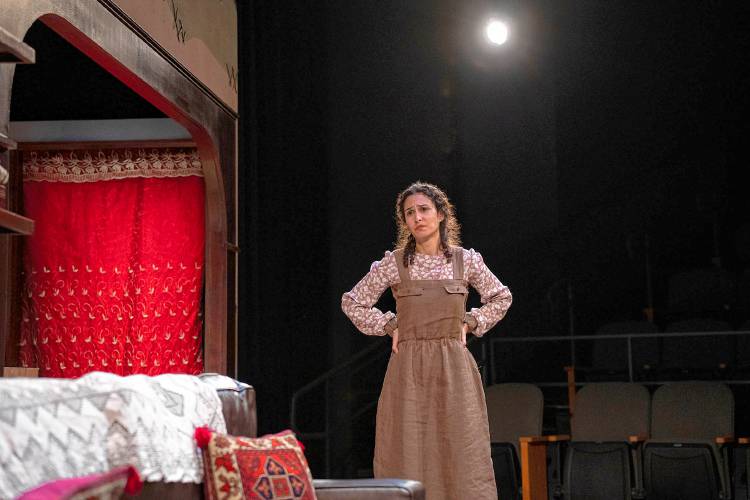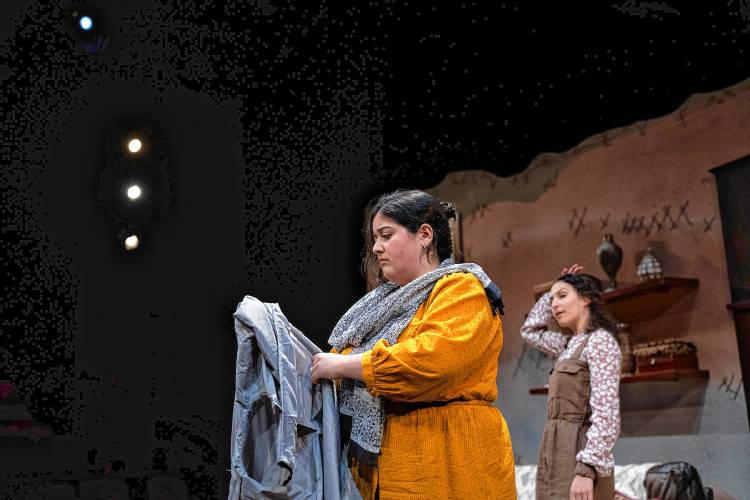Theater Review: ‘Selling Kabul’ a riveting, heartbreaking glimpse at US policies abroad
| Published: 10-18-2023 10:42 PM |
The lights come up on a man alone in a small apartment. Dressed in a T-shirt and tracksuit pants, he’s young and on edge, checking the television and messing with his laptop and a balky router. Given the state of the world, he could be anywhere, searching for information that might explain his cloudy future.
But this is the opening scene of “Selling Kabul,” now in a riveting, heartbreaking production at Northern Stage, and the specifics of the man’s plight are unclear even to him. What viewers soon learn is that the man’s name is Taroon and that he served as a translator with an American military unit. The Americans have departed, Taroon is in hiding and everyone around him is in danger as the Taliban tightens its hold on Kabul and the rest of Afghanistan.
Over the play’s hour and 40 minutes, which covers a fateful evening, the moral implications of Taroon’s position — not safely Afghan, but not yet and perhaps not ever American — unspool in a story that lays bare the awful predicaments faced by ordinary Afghan citizens who’d hoped to build a better country and better lives for themselves. The Taliban’s totalitarian ideology has cramped everything about their lives, down to the way they speak to each other. As American viewers, we should be aware that our culpability and our complacency are up for debate as well.
Not long after Taroon wakes up from a nap and prowls the apartment, his sister, Afiya, comes home. She and her husband, Jawid, have been at the hospital with Taroon’s wife, who has just given birth. Taroon wants to visit her and to hold his son, but Afiya forbids it. Soon it becomes clear that while Taroon is the prime mover of the play’s events, Afiya is its moral center.
Taroon, who spent two years fighting alongside American troops, doesn’t want to hear it, but Afiya will not be deterred.
“Remember, now you have a son, and that son has a father to lose,” she tells him.
Taroon responds, in part, that “this is not how this is supposed to go.”
At one point, Afiya tells Taroon that something he’s said scares her. “Scare you? What, I can’t talk anymore?” he says. “I was just talking.”
Article continues after...
Yesterday's Most Read Articles
 Dartmouth moves swiftly to stymie demonstration, leads to 90 arrests
Dartmouth moves swiftly to stymie demonstration, leads to 90 arrests
 Dartmouth graduate student-workers go on strike
Dartmouth graduate student-workers go on strike
 At Dartmouth, hundreds protest ongoing war in Gaza and express support for academic freedom
At Dartmouth, hundreds protest ongoing war in Gaza and express support for academic freedom
 Art Notes: City Center Ballet celebrates 25 years
Art Notes: City Center Ballet celebrates 25 years
The extent to which the characters are constrained, down to small acts and utterances, are a reminder of how despotism works. Everything falls under the ruling faction’s thumb, including relationships.
Taroon holds out hope of getting a visa to take his wife and child to the U.S. In his demeanor, he’s already part-way there. Afiya is doubtful.
To say more about how the play unfolds would sap it of its revelatory power. With only two other onstage characters, Jawid and a neighbor, Leyla, who has a baby of her own, the offstage action related to the Taliban’s advance creates immense pressure and dramatic tension.
“Selling Kabul” is by no small margin the most powerful piece of theater I’ve seen on an Upper Valley stage. The performance I attended, the final preview on Friday night, was as taut as a thriller, but with the warmth and depth of feeling of a family drama. Even with the villain offstage, the moral complications of the main characters’ lives are profoundly affecting.
The play’s quality is attributable to Sylvia Khoury’s script, which debuted off-Broadway in 2021 and was a finalist for the 2022 Pulitzer Prize for drama. When first performed in New York, “Selling Kabul” was set in 2013, but Northern Stage updated the setting, with Khoury’s permission, to after the August 2021 American withdrawal from Afghanistan, a decision that lends the production added punch and immediacy.
The performance’s quality is a credit to the actors. As Taroon, Nima Rakhshanifar embodies the pent-up life of a man who not long ago had been fighting for his country. Mattico David, who plays Jawid, wears the body language of a man who plans to endure, whatever compromises he must make. Both he and Fatima Maymoon, who plays Leyla, have been in previous productions of “Selling Kabul,” David in the New York production and Maymoon in Seattle. Their comfort with the material is apparent.
As written and performed, “Selling Kabul” belongs to Afiya, and Hana Chamoun plays her with the mixture of steel and heart the role requires. The burden of protecting her brother is greater than he knows, and it tells on her. Chamoun makes visible both the strain on Afiya and her strength.
The technical details of the production are notable mainly for how they get out of the actors’ way. Director Evren Odcikin, most recently interim executive director of the Oregon Shakespeare Festival, has done seamless work here, and the creative team includes several people with one foot in the Middle East and the other in theater, including dramaturge Humaira Ghilzai, costume designer Dina El-Aziz and sound designer Avi Amon.
Their work is an example of how an Upper Valley company can bring global work to a local stage, and as viewers we need to take it seriously. In our daily lives, it’s easy to lose sight of American power, even as we read about current events in the Middle East. “Selling Kabul” is a challenging piece of theater, one that offers us the opportunity to get beyond the political buzzwords and into the lives of people affected by the actions of American policies. It’s the kind of art we need, and that we should have the courage to go see.
Northern Stage’s production of “Selling Kabul” runs through Oct. 29 in the company’s Barrette Center for the Arts in White River Junction. For tickets ($19-$69) and more information, go to northernstage.org or call 802-296-7000.
Alex Hanson can be reached at ahanson@vnews.com or 603-727-3207.



 Bald eagles are back, but great blue herons paid the price
Bald eagles are back, but great blue herons paid the price JAG Productions announces closure, citing ‘crisis facing the arts’
JAG Productions announces closure, citing ‘crisis facing the arts’
